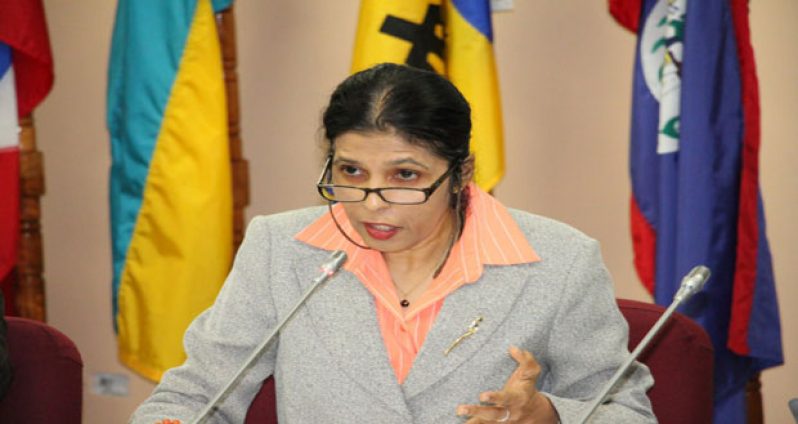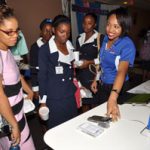Information Communication Technology (ICT) is the fastest growing sector in the world, but girls and young women are behind, even though they are capable of being equal contributors.
International reports estimate that 95 per cent of all jobs now have some kind of digital or ICT component. It is still estimated that more men and young men work in the industry. Some of the reasons cited for girls and young women not being attracted to the vibrant, dynamic sector include: they do not perform well in Math, they are not being smart enough, they do bad in science, and the area sounds boring.
One cannot be certain if these ‘reasons’ are really true, or whether many girls have been made to believe them.
But it is true that women and girls are known to possess many natural strengths.
They are care-givers, relationship builders, communicators, the first to try new things – innovators, holders of knowledge, creative, and builders of solutions.
CARICOM’s Deputy Secretary-General, Ambassador Dr Manorma Soeknandan said it is time girls and women constantly examine and use these natural strengths to determine their best career and life choices.
“We can use these natural strengths to develop and enjoy careers in Science, Technology, Engineering and Mathematics, including ICT,” she said in an address broadcast online in member states of CARICOM.
The occasion on Thursday, a celebration of Girls in ICT Day, was hosted by the CARICOM Secretariat in Georgetown, Guyana under the theme ‘Expand Horizon, Change Attitude’.
Girls in ICT Day provides an opportunity for girls and young women to see and experience ICTs in a new light, encouraging them to consider a future in technology.
The observance was the second by the CARICOM Secretariat and the third worldwide.
It is an initiative supported by International Telecommunications Union (ITU) member states in Plenipotentiary Resolution 70 (Guadalajara, 2010) to create a global environment that empowers and encourages girls and young women to consider careers in the growing field of ICTs. This year’s sub-theme is ‘Girls and Women and Innovation’.
CHANGE
“When one hears innovation — one thinks of ICT. However, at the simplest level, innovation just means to change or make something new or try something new. So we hope we can change your thinking or that what you experience today can help you to change and influence others (both boys and girls) – to do something new which adds value to yourselves, your community, your country and this Caribbean region and the world,” the CARICOM Deputy Secretary-General told her Caribbean audience via video link.
The countries tuned into the broadcast were The Bahamas, Barbados, Belize, Grenada, Haiti, Montserrat, St. Vincent and the Grenadines, Suriname and Anguilla.
At the secretariat, there were students from several local schools and the University of Guyana.
Also addressing the occasion through videoconferencing, CARICOM Youth Ambassador in The Bahamas, Khadijah Young, said the video connection is testimony of the power of ICT.
ICT has changed the world tremendously since practically everything we do involves some form of technology: from the Smartphone, to the classroom, to the modern means of transportation today.
Young also urged her audience to embrace ‘girl power’, step out of their comfort zone and embrace the emerging field of ICT.
REACH FOR THE STARS!
She said females can do well as their male counterparts in ICT, urging them to: “Go for it!” “Reach for the stars!” And work hard to achieve you goals.
ICT is about people, for people and it is now everybody’s business. It is also foreign policy and world affairs, legal affairs, human and social development, security, trade and economic development, gender issues and religion.
In developed countries, several studies and reports support the fact that when more women and girls join the workforce in sectors supported and dependent on Science, Technology, Engineering and Mathematics (STEM), there is accelerated social and economic development.
They therefore bring a special perspective to the STEM field.
The history of women in ICT goes all the way back to one of the first computers called the ENIAC, which stands for Electronic Numerical Integrator and Computer.
In 1946, 69 years ago, the first programmers of ENIAC were young women since it was considered ‘not sufficiently manly’ to do that type of work.
“You should need no further proof that women — young women — were there at the beginning of the information revolution.
“I am sure that we would all agree that there are many things we can do or would wish to see that make our Region better. Access to ICT services and education may be two of those things on your list. ICT is one of the sectors which can make a positive contribution to the development of the Region. We need more success stories in our Region from all sectors – in particular, we need many more from ICT if we are going to truly transform our Region,” Ambassador Soeknandan said.
ROLE MODELS
But she said there is need for more role models, to encourage companies and businesses to open more opportunities for internships.
Importantly too, she said greater attention should be placed on spreading positive messages about Science, Technology, Engineering, Mathematics and ICT, and the role and relevance of ICT in schools at all levels, in particular, primary and secondary schools.
“We need to speak more and help more girls join the ICT revolution. But joining the ICT revolution should not lead to devolution or devaluation of our moral/ethics and cultural values. We should not become weak and end up in situations whereby others control us emotionally.
“I challenge you to become active advocates of bridging the gender gap across the Region and the world. Advocate that girls and women study and train for and go after the high-level, high-paying jobs in the ICT industry.
“We need more girls and women’s voices in everything that is happening across the Region. There is always something new happening or something new that needs to happen. You are not too young to become involved and to lead the charge,” Ambassador Soeknandan said.
ICT is about working with people, solving problems, finding solutions and making a difference to, and in peoples’ lives.
“I strongly encourage you to step outside the usual comfort zones (outside of the ‘box’ so to speak) and investigate the endless possibilities available in and through ICT. Especially, the use of ICT in other key sectors (such as medicine, bio-engineering, robotics, news, waste, agriculture and recycling) which will make a difference in your life and in the life of others,” the Ambassador told the gathering at the CARICOM Secretariat and her online audience.
The occasion featured exhibitions from the University of Guyana, Centre for Communications Studies; CARICOM; Digicel; the Guyana Telephone and Telegraph Company (GT&T); NT Computec; and Starr Computers.
The objectives were to reinforce the concept of ‘Girls in ICT Day’ within the CARICOM Secretariat and the wider community; celebrate and commemorate the International Girls in ICT Day; providing a modified ‘open day’ to the Secretariat; partner with the private sector to provide an opportunity for girls to get inspired about the ICT sector by introducing them to topical applications and devices; and exposing girls, teachers and staff members to some ICT career options and existing jobs in ICT.
By Tajeram Mohabir



.jpg)












